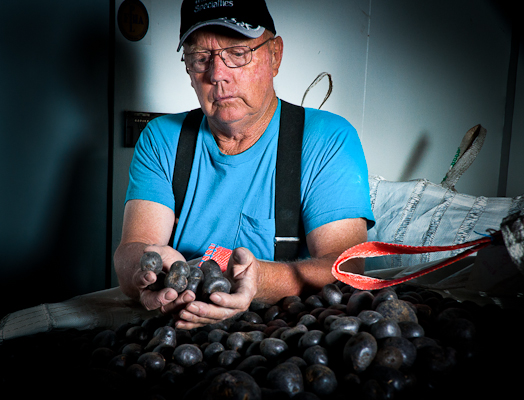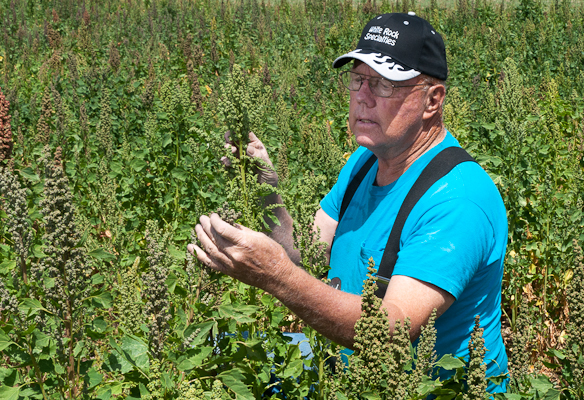Gas, coffee and quinoa: A life changing pit stop.
The San Luis Valley is a high-altitude agricultural basin covering approximately 8,000 square miles in southern Colorado and northern New Mexico. The average elevation of 7,664 feet above sea level is similar to the Altiplano regions of Ecuador, Bolivia, Chile and Peru where 90 percent of the world’s supply of quinoa (keen wa) is grown.
The valley is home to the Great Sand Dunes National Park, the tallest sand dunes in North America, the Colorado Gators Reptile Park, and SunEdison, one of the largest solar electric facilities in the United States. It is also one of the top five largest potato growing regions in the U.S. and home of the The Mosca Pit-Stop (click to see photo) a convenience store owned by Ernie New and his family.
NEW
My wife’s dad and mom was trying to retire from the farm so we came down and I tried taking the reins. I taught school in Denver for nine years but I decided raising a family in Denver was not what I wanted to do. I would prefer to raise them on the farm.
My wife’s dad was going to do a lot of the management and I was going to do the work out on the farm and so on. That lasted about six months and then he got cancer and died in the next four or five months. It was a way for me to get my feet wet in a hurry.
In the early 1980s, we were producing grass-fed beef and stone ground wheat flour. As I started trying to farm we were trying to do everything organic — sheep and cattle and small grains.
TRIBUTARY
Then the economic depression struck about that time and you went broke. Is that when you went to work as a mechanic at the Pit-Stop shop?
NEW
Yes. I leased the farm out to a potato operation and I told him I didn’t want him using any chemicals. I decide from the beginning that organics was the way to do it if we could. That was before any organic certification of any kind was out there. My family had already been growing organically for years.
After a while, I was then able to purchase the Pit Stop.
TRIBUTARY
So now you were a gas station/convenience storeowner trying to survive.
NEW
Well, in 1984, a guy name Dave Cusack came into the Pit-Stop and of course we had coffee and so on and he was needing some gas. We set down and we visited and I found out he was doing some project with this new plant, which was called quinoa, that I’d never heard of and no one else had either.
David Cusack, was a history professor at the University of Denver. He had been trying to grow quinoa down here. He discovered when the seeds were planted on a field that was following potatoes, the herbicide they had sprayed on the potatoes in the last year to kill the weeds had enough residual value that it killed the quinoa this year.
So Cusack told me, while we drank coffee, that he was looking for an organic farm with no chemicals on it. So I said, sure we’ll try some, and that was in 1984. But he was gunned down in Bolivia that summer. So that put the project on hold.
We soon found out that his sister in Denver had some quinoa seed which she gave us and I planted two rows about 100 feet long and it did just beautiful.
Meanwhile we had found a market for our whole grain wheat through organic grocers like Vitamin Cottage, Alfalfas and gourmet restaurants in Denver. In 1987 we hadn’t grown enough quinoa to even talk about. At this time we had a chance to payback some of the loans to FHA and start farming again.

Ernie New grows specialty potatoes in rotation with quinoa. Looking through a bin of Purple Majesties, the crop is stored in a cool, dark storage shed to preserve the color and taste.
TRIBUTARY
When did you start growing potatoes?
NEW
I had not done potato farming, row crop farming, before I got involved in the quinoa. We were actually into the small grains, cattle, sheep and alfalfa more than anything else.
Being an organic farm you can’t plant the same crop on the same field year after year because the bugs and diseases take over, the nutrients aren’t there and so on. So we had to come up with some kind of rotation so we decided we would add potatoes to the rotation. We tried about seven or eight different varieties of potatoes on about five acres.
The next year, I said, everyone else down here grows reds and russets. I had in mind a good tasting purple potato that stays purple when I cook it. I wanted yellow potatoes. I wanted all these different varieties. We wanted something else that everybody else wasn’t doing.
Over time the production of potatoes increased and we do about 130 acres of specialty potatoes. The organic industry a few years back said that you have to plant organic seed to grow organic food. So we wound up selling organic seed potatoes to organic farmers across the nation who grow for farmer’s markets, or gourmet restaurants or natural grocers. So we wound up in the seed business. Most of our potatoes that we grow now actually go into seed production.
My favorite is the Purple Majesties and we grow a lot of them. We plant about 130 acres of quinoa a year, about the same as the potatoes. Quinoa, depending on how bad the wind is, or how bad the bugs are, how hot it is, may not produce that much.
TRIBUTARY
When did the quinoa sales start to take off?
NEW
(Turning to his son Paul who is in charge of operations) Have we made any money on quinoa yet? (“Not yet,” Paul replies laughing). Quinoa has been kind of a burden and why do we stay with it? I don’t know. I guess I’m just bull headed. Quinoa was really tough to learn to grow.
TRIBUTARY
How do you market it?
NEW
It’s word of mouth more than anything. Chefs call us and when you get it into the hands of a chef, the word spreads quickly from one to another; same way with fingerlings and Purple Majesties.
Because quinoa is gluten free, there is quite a group of people out there that buy from us and have been for several years. Early on, Kellogs, General Mills — the cereal companies wanted to use quinoa to improve their cereals. Well we couldn’t grow enough for them. So we said no. We get a phone call every few days trying to buy quinoa. Ok, how much do you want?
Oh, we want a semi load every two weeks.
No way. It’s just not possible.
TRIBUTARY
What is preventing you from meeting the demand?
NEW
Well, I’m out of time. At 70 years old, I don’t have that time left. Seriously, you never know when you can grow it from this year to the next. Are the bugs going to get it or is the wind going to take it. Last year we have one field that the wind and sand damaged the growth point and we didn’t get anything out of that field. So you get it almost ready to harvest and a hailstorm comes through and wipes it out. It’s a real gamble.
TRIBUTARY
And all this started over a cup of coffee with a stranger at the Pit-Stop talking about an unknown edible seed from the Andes. You became one of the first growers of quinoa in the U.S.
NEW
It’s been a real ride! And I don’t thinks it’s over with yet. There is a lot of interest in quinoa all over the world now. They are starting to grow it in Egypt, England in all kinds of places. There is also a lot of research being done now about how to grow it.
TRIBUTARY
How would you define your success?
NEW
It is very satisfying to get out there and dig around in the earth and plant and see how God lets it grow and how good it tastes. But what I’m most proud of are my kids.
I raised three great kids and they have great families. None of the grandkids are in jail. One is a freshman at the Air Force Academy. One is a senior at the School of Mines studying chemical engineering. Another granddaughter is in CSU studying dance. Two of my younger granddaughters are into gymnastics and doing very well in competition.
TRIBUTARY
Can our readers buy quinoa and potatoes from you directly?
NEW
If you want to write about us, we appreciate it, but you also have to state that no one will able to order any quinoa because we are constantly sold out. Period. You may have a better chance of getting the specialty potatoes. They are in a lot of the super markets but they may not say White Mountain Farm on the label. We package for companies like New Sprout Organic Farms so that bag goes to North Carolina for sale and people have no idea that they are ours, and that’s all right.

